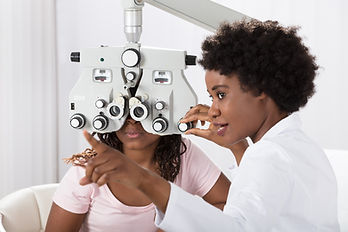
Hearing and Vision
Hearing & Vision:
Reduce preventable childhood hearing and vision loss.
Our goal in the hearing program is to identify hearing loss in children as early as possible, to help reduce preventable childhood hearing loss or ear disease, and initiate necessary steps to alleviate and reduce the trauma of hearing loss.
Our goal in the vision program is to identify children with vision problems and assure referral to eye care professionals. Children often enter school with vision problems, because they are unaware that they see differently. Early identification is important.
Appointments
Tuscola County Health Department Appointments:
Appointments are available at the health department for free vision and hearing screening by Hearing and Vision Technicians trained and evaluated by the Michigan Department of Health and Human Services.
Local School District Appointments:
In cooperation with your local school district, hearing and vision testing is also offered through your child's school years according to the following schedule:

Screenings can be done in other grades if there is a concern.


Hearing and Vision Testing: What to Expect
When a child does not pass a hearing or vision screen, parents will be notified and encouraged to take their child to a doctor for follow-up.
Most of the hearing losses found in this program are in the mild to low-moderate range of severity. The physician will often find an external or middle ear problem to explain these losses and offer corrective treatment. Children with moderate losses, or worse, often have a permanent inner ear component even if external or middle ear pathology is identified. These children may require extensive otological, audiological and educational evaluation.
At initial vision testing and/or re-testing, children who are unable to pass one or more exercises which screen for muscle imbalance, visual acuity and farsightedness are referred to an eye doctor of the family's choice. Children who display symptoms of strabismus, ptosis, nystagmus, or anisocoria are also referred to an eye doctor.
Children may qualify for Children's Special Health Care Services Program.
FAQs
-
What does enrollment in CSHCS offer?Helps pay for visits to specialists. May help pay for specialized equipment such as wheelchairs when they relate to the CSHCS qualifying medical condition. May help pay for medications when they relate to the CSHCS qualifying medical condition. Coordination of services and assistance with finding community resources. May assist with travel and lodging expenses relating to treatment. and care for the CSHCS qualifying medical diagnosis. May help to pay medical bills for a child who has recently died.
-
What does CSHCS NOT pay for?CSHCS does not cover primary care, well-child visits, mental health care, or immunizations (with the exception of flu and COVID-19 vaccinations for those otherwise uninsured).
-
How do I join?Ask your child's specialist to send a report about your child's condition to us. If your child has not seen a specialist, we can make arrangements to have your child evaluated. Your child's medical condition, not your income determines if you qualify for this program. If your child qualifies, he or she will be invited to join the program. An application will be mailed to you. A review of this application will determine if we will ask you to share in the cost of services.
